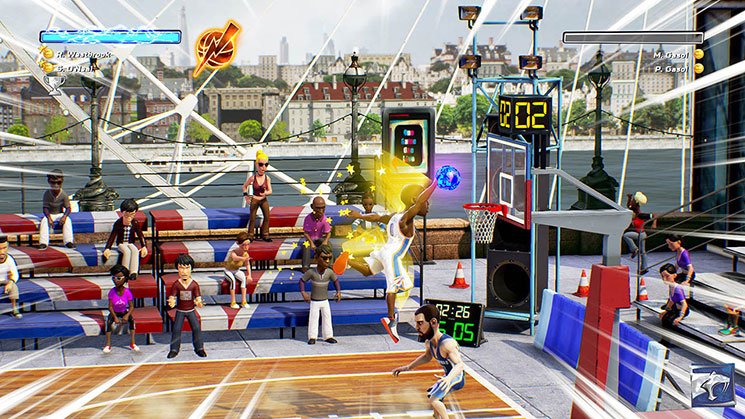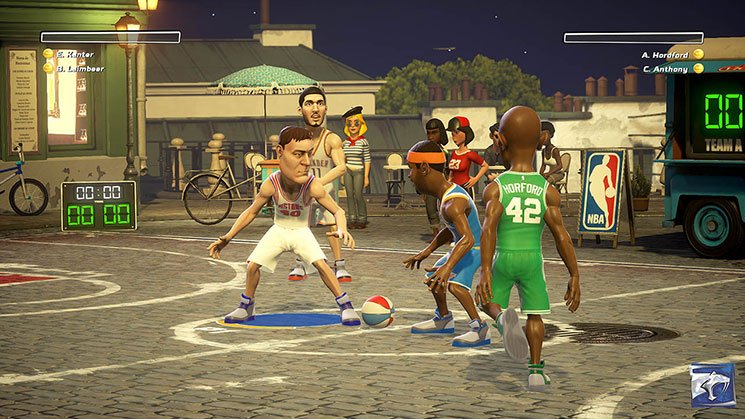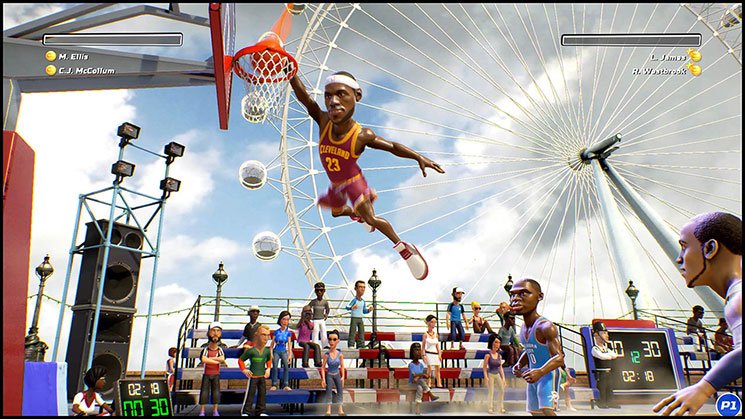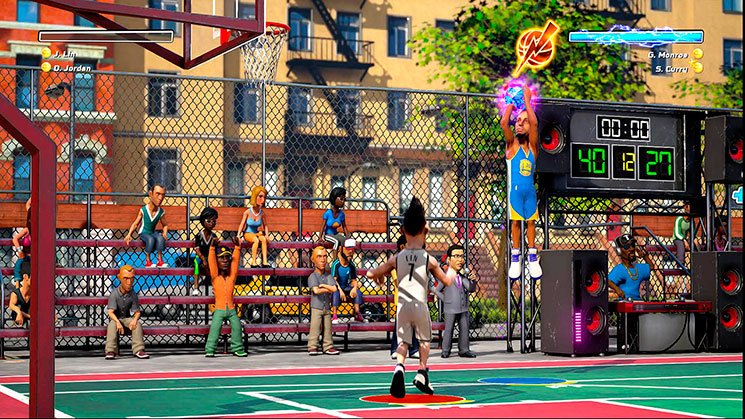NBA Playgrounds Review
As the yearly iterations of Madden and NBA2k continue to be churned out, it’s always refreshing when a developer dials back the increasingly complex nature of these sports games and offers something a little more simple and zany. Titles like NFL Blitz, The Bigs, and NHL Hitz – these are the types of sports games that tend to draw me in over their more elaborate counterparts. Some of the most prominent basketball equivalents of these might be the NBA Jam franchise as well as the lesser but similarly enjoyable NBA Street. Saber Interactive’s NBA Playgrounds takes a page from the playbook of these titles, stripping down the fluff and shrugging off the intricacies the sport often demands. At the same time, it manages to capture the essence of what makes basketball fun, despite some questionable mechanics that occasionally cripple the experience. The result is an overall appealing competitive multiplayer game with some unrealized potential.

There were certainly plenty of fun moments to be had during my run through the campaign and from my various multiplayer romps with friends. Yet at the same time, the lack of content, along with a few glaring weaknesses in the gameplay prevent it from reaching, or even approaching classic status. In addition, while the simplistic two-on-two streetball did produce some feelings of NBA Jam and Street nostalgia, I also got a sense that the gameplay never really outdid its spiritual predecessors, nor did it offer many notable unique attributes. More often than not though, the enjoyable gameplay strangely defied the weight of its flaws, like a gravity defying dunk from Jordan himself (who is, by the way, unfortunately absent from the roster) .
To its credit, NBA Playgrounds utilizes a rather neat gimmick as one of its fundamental features; the ability to unlock a plethora of NBA players from obtainable card packs to use in game. These packs are unlocked by achieving various in-game tasks, completing tournament games, as well as gaining experience points and eventually leveling up. There are a handful of players representing each pro team, and they span a wide range in both skill-set and time period; from Bill Russell and Bill Laimbeer to Jeremy Lin and LeBron James. The sheer randomness of the players earned from the decks makes for some amusing reveals and provides a nudge of enticement to play on and unearth more. You’ll be thrown some freebies right from the get go in order to get started. Each of these obtained players can level up a couple of times as well to improve their stats, which presents a welcomed dimension of depth.
Once you’ve sifted through the vast range of cartoony, disproportionately large-headed players and picked a duo that you favor, you’re ready to play some ball. You can get a basic customizable exhibition game going, or run through the game’s version of a campaign, called “Tournament Mode”, which can be completed solo or with a friend locally. Switch owners will be disappointed to learn that the option to play Online is absent, weeks after launch, despite being available on other console versions of the game. This is a pretty notable void if you intend on delving deep into the multiplayer, as solo exhibitions get old quick, and the campaign can be knocked out relatively quickly. It cuts out a significant portion of the replay value, and for a game otherwise minimalistic in content, this is problematic. Also, juggling between control of two players and dealing with some absurdly cheap AI usually proves to be a weaker experience than playing with real opponents or teammates. While the ability to play the game on the go is a nice bonus for the Switch, it does little to offset the absence of online play.

The matches in Tournament Mode take place on small, schoolyard style basketball courts in a variety of locations, from the streets of New York, to Venice Beach, and even Tokyo. These environments provide some neat backdrops that subtly but effectively provide a touch of eye candy and character. Each tourney comes with four rounds, in which you will face off against various pre-set NBA player duos. Completion of tournaments will land you additional stages to use at your disposal in future matches. The main form of replayability, once you’ve completed this mode and gained every available level, comes in the form of challenges, which are merely a variety of in-game goals. Some of these were successful in coaxing me back after conquering the league with my LeBron and Bill Walton combo, but many – such as landing 15 steals – were just too tricky to bother with.
The actual gameplay is pretty straightforward once you’ve fumbled around with the somewhat awkward controls at first. Just like NBA Street and NBA Jam before it, Playgrounds manages to whittle down the complexities of basketball to a more straight-forward two-on-two streetball. At the same time, it ups the ante in terms of pacing and intensity, thanks to far shorter game lengths and shot clocks, smaller courts, as well as the welcome omission of refs and thus fouls. But that’s not to say there aren’t strokes of complexity that more seasoned basketball fans might appreciate. At your disposal are shot fakes, alley-oops, crossover moves – which help you get a clear lane to the basket for a dunk or layup, as well as elbow throwing to shake off a tight defense. You can even get additional points for landing perfectly timed shots; though unlike my CPU counterparts, I found it difficult to execute this with consistency.
One key component that the game borrows from its spiritual predecessor, NBA Jam, is the turbo meter. You’ll need to utilize this with care, as it drains quickly, and sets the stage for better performances when used wisely. There is also the oddly titled “lottery pick meter”, which in fact does not allow you to draft players as one might initially think, but instead grants a randomly generated ability or advantage when filled. These are vital factors that can often turn the tide of a game. They include double point values for shots, faster player speed, and the ability to drain a basket from anywhere. While they do add an exciting dynamic to the game, their random nature can lead to some unfair and unbalanced segments during matches, and the AI tends to milk these quite ridiculously as well. One notable match of mine involved my AI opponents earning a rare double score ability for three pointers, after which they proceeded to land three perfect shots in a row from behind the arc, quickly putting the game well out of reach.

Each match in the game’s tournament campaign significantly escalates in difficulty, which really just means that opposing players get much better at knocking down shots, move more swiftly, and grow increasingly aggressive in swiping the ball away from you. Make no mistake, although the game stresses simplicity, some of the latter stages in the game’s Tournament Mode and Exhibition’s expert level AI can be insanely and disproportionately hard. There were moments where I actually laughed out loud from the absurdity of the tougher AI’s superhuman accuracy with a basketball, while I would sometimes need to struggle for easy, close-range buckets. Shaq would knock out fadeaway jumpers from beyond half court with two players guarding him, while I proceeded to brick wide open jumpers with LeBron three feet from the basket. At that point, any remaining sense of authenticity or accuracy in emulating the dynamics of basketball pretty much evaporated. No offense, Shaq.
There are also a few questionable mechanics which feel as if they could use some refining, including the ease of landing three pointers vs pulling off dunks, which are often inexplicably botched, especially with the more mediocre players. As dunking is one of the most enjoyable and satisfying aspects of the game, it’s a shame they can’t be executed more easily. Additionally, it’s a bit too easy to swipe the ball away from opponents, and likewise harder to maintain possession yourself without opponents getting their grubby paws on the ball. Easier CPUs will tend to play a more passive defensive game and allow you to move the rock at will, but the more difficult opponents who catch you stationary for more than a second or two will almost always make you pay. The game also oddly disregards buzzer-beating shots, as everything comes to a complete and abrupt stop once the game clock hits zero even if the ball is in midair. Finally, the intensity of the rumble on the Switch version is dialed up to an insane level, and certain actions in the game with make those suckers sound like a jet engine.
Still, in many ways, NBA Playgrounds holds a degree of enjoyment and charm precisely because of its absurd, cartoony nature that distances itself from realism and traditional, by-the-books basketball. Nowhere is this brand of wacky, arcade-style entertainment more apparent than the game’s multiplayer. Again, I can’t speak for the online play thanks to the gimped Switch version, but local multiplayer has definitely been the highlight of my NBA Playgrounds experience. Particularly when playing against buddies with a similar skillset, there were ample moments of laughter, trash talking, and most importantly, pure and undiluted fun.

NBA Playgrounds’ aesthetics parallel the simplistic, zany nature of the game. The players take on a sort of claymation-meets bobble head vibe, and there is an overall barebones and crude look to the visuals. This is especially apparent when playing handheld mode on the Switch, as the graphics appear a bit muddled, in true old school CRT fashion. Hey, maybe that’s what they were going for? Though the graphics remain overall serviceable, and the backgrounds of the environments do a fine job in coloring the scene with a bit more flair and detail. The soundtrack is similarly minimalistic, utilizing an old-school hip hop and techno style that fits well with the game, often overlaid with some stylistic elements that match the character of the environments you play in. Voice tracks from the play by play guys standing off to the sidelines are amusing at first, but the abundance of their commentary and quips grows stale a bit quick. Thankfully, they can be switched off.
NBA Playgrounds proves to be a mixed bag, even for those who favor the more off-the-wall and frantic nature of say, an NBA Hangtime. Mechanically, it could use a bit of tweaking, and the gameplay doesn’t provide a ton of content, particularly to Switch owners awaiting online play. But at the end of the day, the gameplay holds up just enough to offer an enjoyable experience, and satisfies the itch for a frantic, no-nonsense style of street basketball that NBA Jam did such a great job of capturing.
